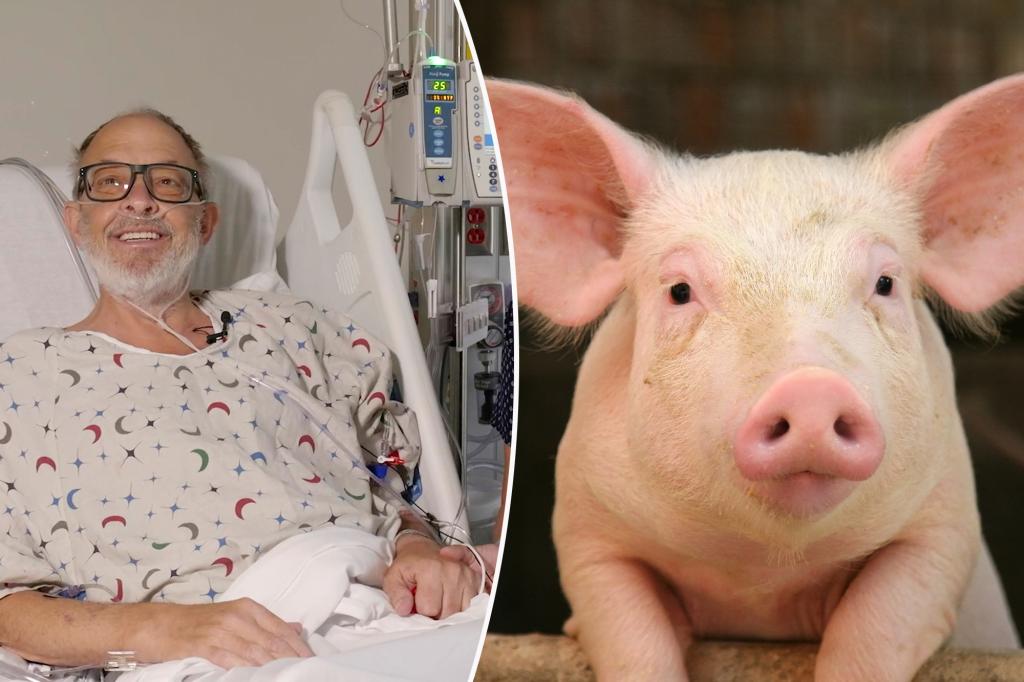WASHINGTON – Surgeons have transplanted a pig’s heart into a dying man in an attempt to prolong his life – only the second patient ever to undergo such an experiment.
Two days later, the man was joking and could sit in a chair, Maryland doctors said Friday.
The 58-year-old Navy veteran faced almost certain death from heart failure but other health problems meant he was ineligible for a traditional heart transplant, according to doctors at the University of Maryland Medicine.
“No one knows from now on. At least now I have hope and I have a chance,” Lawrence Faucette, of Frederick, Maryland, said in a video recorded by the hospital before Wednesday’s surgery. “I’ll fight tooth and nail for every breath I can draw.”
Although the next few weeks will be critical, doctors are excited by Faucette’s initial response to the pig organs.
“You know, I keep shaking my head – how do I talk to someone with a pig’s heart?” Dr. Bartley Griffith, who performed the transplant, told The Associated Press.
He said doctors feel “a great privilege but, you know, a lot of pressure.”
The same Maryland team last year performed the world’s first transplant of a genetically modified pig heart into another dying man, David Bennett, who survived just two months.
 University of Maryland School of Medicine (UMSOM) faculty performed the surgery on Lawrence Faucette of Frederick, Maryland.UMSOM
University of Maryland School of Medicine (UMSOM) faculty performed the surgery on Lawrence Faucette of Frederick, Maryland.UMSOM
 Surgeons have transplanted a pig’s heart into a dying man – only the second patient ever to undergo the experimental procedure.AP
Surgeons have transplanted a pig’s heart into a dying man – only the second patient ever to undergo the experimental procedure.AP
 “No one knows from now on. At least now I have hope and I have a chance,” said Navy veteran Lawrence Faucette. He is shown at the hospital with his wife, Ann.AP
“No one knows from now on. At least now I have hope and I have a chance,” said Navy veteran Lawrence Faucette. He is shown at the hospital with his wife, Ann.AP
There is a huge shortage of human organs being donated for transplantation. Last year, there were just over 4,100 heart transplants in the US, a record number but the supply is so tight that only patients with the best chance of long-term survival are offered.
Attempts to transplant animal organs into humans have failed for decades, as the human immune system immediately destroys the foreign tissue. Now scientists are trying again to use genetically modified pigs to make their organs more human-like.
More recently, scientists at another hospital have been testing pig kidneys and hearts in donated human bodies, hoping to learn enough to begin formal studies of so-called xenotransplants.
To do this new trial on patients who are still alive outside of the strict trial, the Maryland researchers needed special permission from the Food and Drug Administration, under a process reserved for certain emergency cases with no other options.
It took more than 300 pages of documents to be filed with the FDA, but the Maryland researchers made their case that they had learned enough from their first trial last year — even though the patient died for reasons not fully understood — that it made sense to try again.
 Surgeons perform a pig heart transplant at the University of Maryland School of Medicine hospital in Baltimore, Maryland.AP
Surgeons perform a pig heart transplant at the University of Maryland School of Medicine hospital in Baltimore, Maryland.AP
Dan Faucette, who retired as a lab technician at the National Institutes of Health, had to agree that he understood the risks of the procedure.
In a statement, his wife, Ann Faucette, said: “We have no hope but to wish for more time together. It can be as simple as sitting on the front porch and drinking coffee together.”
What’s different this time: Just after last year’s transplant, scientists discovered signs of a pig virus hiding in the heart – and they now have a better test to find the hidden virus.
They also made some medication changes.
Perhaps more importantly, even though Faucette had end-stage heart failure and no other options, he was not near death like previous patients.
 A surgeon prepares a pig’s heart for transplantation.UMSOM
A surgeon prepares a pig’s heart for transplantation.UMSOM
By Friday, his new heart was working well without any support machinery, the hospital said.
“It’s an amazing feeling to see this pig heart working in a human,” said Dr. Muhammad Mohiuddin, xenotransplantation specialist of the Maryland team.
But, he warned, “we don’t want to predict anything. We will take every day as a victory and move forward.”
This “compassionate use” of single patients can provide some information about how pig organs work but not nearly as much as more formal tests, said Karen Maschke, a research scholar at the Hastings Center who helped develop ethical and policy recommendations for xenotransplant clinical trials.
The FDA’s approval of this second case “suggests that the agency is not ready to allow porcine heart clinical trials to begin,” Mashke added.
The pig hearts, provided by Blacksburg, Virginia-based Revivicor, have 10 genetic modifications – knocking out some pig genes and adding some human genes to make them more acceptable to the human immune system.
 In this file photo, pigs are seen on a farm in Argentina, in September 2020. Chinese scientists have successfully grown a kidney containing human cells in a pig embryo, a first in the world at the time. AFP via Getty Images
In this file photo, pigs are seen on a farm in Argentina, in September 2020. Chinese scientists have successfully grown a kidney containing human cells in a pig embryo, a first in the world at the time. AFP via Getty Images
The Associated Press Department of Health and Science receives support from the Department of Science Education of the Howard Hughes Medical Institute. AP is solely responsible for all content.
Categories: Trending
Source: thtrangdai.edu.vn/en/




